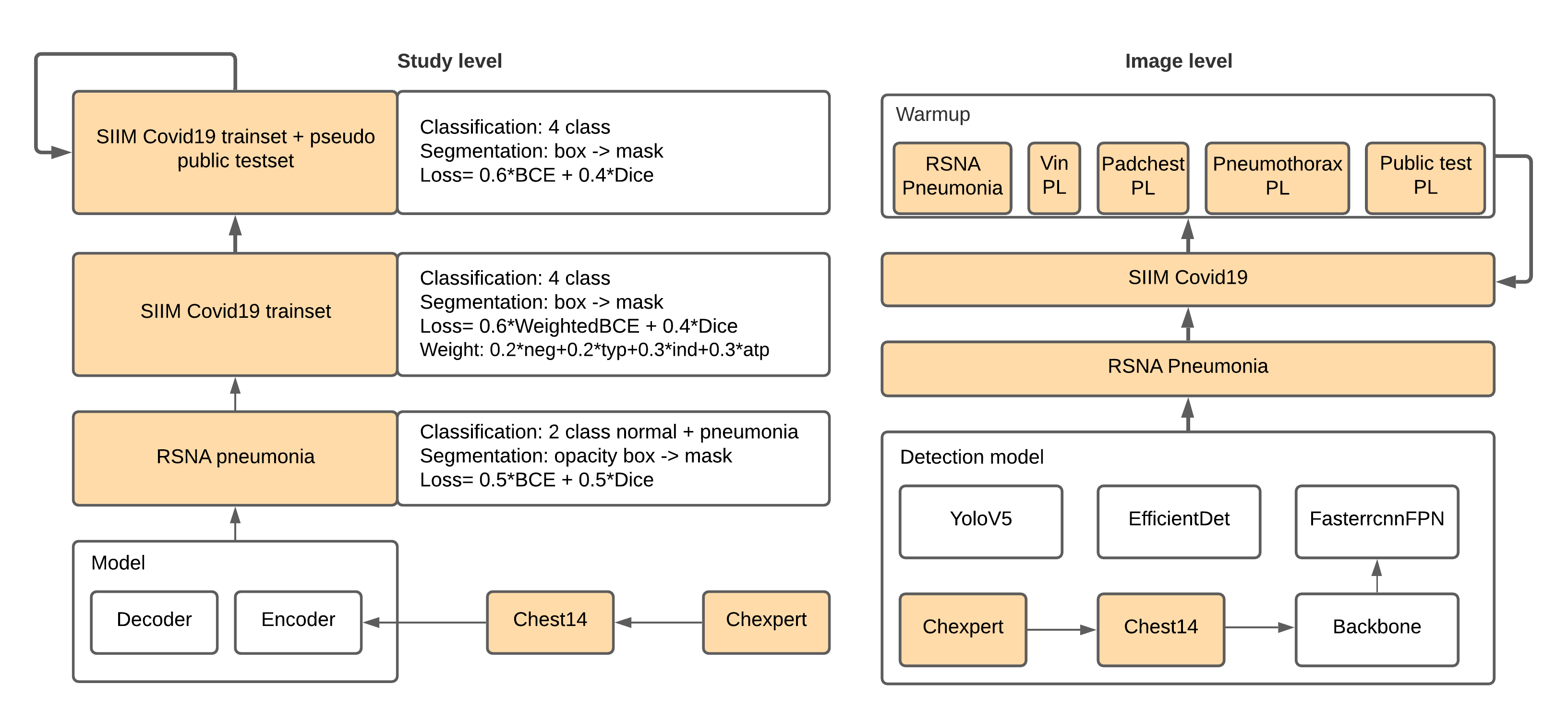Source code of the 1st place solution for SIIM-FISABIO-RSNA COVID-19 Detection Challenge.
- Ubuntu 18.04.5 LTS
- CUDA 10.2
- Python 3.7.9
- python packages are detailed separately in requirements
$ conda create -n envs python=3.7.9
$ conda activate envs
$ conda install -c conda-forge gdcm
$ pip install -r requirements.txt
$ pip install git+https://github.com/ildoonet/pytorch-gradual-warmup-lr.git
$ pip install git+https://github.com/bes-dev/mean_average_precision.git@930df3618c924b694292cc125114bad7c7f3097e
- download competition dataset at link then extract to ./dataset/siim-covid19-detection
$ cd src/prepare
$ python dicom2image_siim.py
$ python kfold_split.py
$ prepare_siim_annotation.py # effdet and yolo format
$ cp -r ../../dataset/siim-covid19-detection/images ../../dataset/lung_crop/.
$ python prepare_siim_lung_crop_annotation.py
- download pneumothorax dataset at link then extract to ./dataset/external_dataset/pneumothorax/dicoms
- download pneumonia dataset at link then extract to ./dataset/external_dataset/rsna-pneumonia-detection-challenge/dicoms
- download vinbigdata dataset at link then extract to ./dataset/external_dataset/vinbigdata/dicoms
- download chest14 dataset at link then extract to ./dataset/external_dataset/chest14/images
- download chexpert high-resolution dataset at link then extract to ./dataset/external_dataset/chexpert/train
- download padchest dataset at link then extract to ./dataset/external_dataset/padchest/images
- Note: most of the images in bimcv and ricord duplicate with siim covid trainset and testset. To avoid data-leak when training, I didn't use them. You can use script src/prepare/check_bimcv_ricord_dup.py
$ cd src/prepare
$ python dicom2image_pneumothorax.py
$ python dicom2image_pneumonia.py
$ python prepare_pneumonia_annotation.py # effdet and yolo format
$ python dicom2image_vinbigdata.py
$ python prepare_vinbigdata.py
$ python refine_data.py # remove unused file in chexpert + chest14 + padchest dataset
$ python resize_padchest_pneumothorax.py
dataset structure should be ./dataset/dataset_structure.txt
- Stage1
$ cd src/classification_aux
$ bash train_chexpert_chest14.sh #Pretrain backbone on chexpert + chest14
$ bash train_rsnapneu.sh #Pretrain rsna_pneumonia
$ bash train_siim.sh #Train siim covid19
- Stage2: Generate soft-label for classification head and mask for segmentation head.
Output: soft-label in ./pseudo_csv/[source].csv and public test masks in ./prediction_mask/public_test/masks
$ bash generate_pseudo_label.sh [checkpoints_dir]
- Stage3: Train model on trainset + public testset, load checkpoint from previous round
$ bash train_pseudo.sh [previous_checkpoints_dir] [new_checkpoints_dir]
Rounds of pseudo labeling (stage2) and retraining (stage3) were repeated until the score on public LB didn't improve.
- For final checkpoints
$ bash generate_pseudo_label.sh checkpoints_v3
$ bash train_pseudo.sh checkpoints_v3 checkpoints_v4
- For evaluation
$ CUDA_VISIBLE_DEVICES=0 python evaluate.py --cfg configs/xxx.yaml --num_tta xxx
mAP@0.5 4 classes: negative, typical, indeterminate, atypical
| SeR152-Unet | EB5-Deeplab | EB6-Linknet | EB7-Unet++ | Ensemble | |
|---|---|---|---|---|---|
| w/o TTA/8TTA | 0.575/0.584 | 0.583/0.592 | 0.580/0.587 | 0.589/0.595 | 0.595/0.598 |
8TTA: (orig, center-crop 80%)x(None, hflip, vflip, hflip & vflip). In final submission, I use 4.1.2 lung detector instead of center-crop 80%
4.1.2 Lung Detector-YoloV5
I annotated the train data(6334 images) using LabelImg and built a lung localizer. I noticed that increasing input image size improves the modeling performance and lung detector helps the model to reduce background noise.
$ cd src/detection_lung_yolov5
$ cd weights && bash download_coco_weights.sh && cd ..
$ bash train.sh
| Fold0 | Fold1 | Fold2 | Fold3 | Fold4 | Average | |
|---|---|---|---|---|---|---|
| mAP@0.5:0.95 | 0.921 | 0.931 | 0.926 | 0.923 | 0.922 | 0.9246 |
| mAP@0.5 | 0.997 | 0.998 | 0.997 | 0.996 | 0.998 | 0.9972 |
Rounds of pseudo labeling (stage2) and retraining (stage3) were repeated until the score on public LB didn't improve.
- Stage1:
$ cd src/detection_yolov5
$ cd weights && bash download_coco_weights.sh && cd ..
$ bash train_rsnapneu.sh #pretrain with rsna_pneumonia
$ bash train_siim.sh #train with siim covid19 dataset, load rsna_pneumonia checkpoint
- Stage2: Generate pseudo label (boxes)
$ bash generate_pseudo_label.sh
Jump to step 4.2.4 Ensembling + Pseudo labeling
- Stage3:
$ bash warmup_ext_dataset.sh #train with pseudo labeling (public-test, padchest, pneumothorax, vin) + rsna_pneumonia
$ bash train_final.sh #train siim covid19 boxes, load warmup checkpoint
- Stage1:
$ cd src/detection_efffdet
$ bash train_rsnapneu.sh #pretrain with rsna_pneumonia
$ bash train_siim.sh #train with siim covid19 dataset, load rsna_pneumonia checkpoint
- Stage2: Generate pseudo label (boxes)
$ bash generate_pseudo_label.sh
Jump to step 4.2.4 Ensembling + Pseudo labeling
- Stage3:
$ bash warmup_ext_dataset.sh #train with pseudo labeling (public-test, padchest, pneumothorax, vin) + rsna_pneumonia
$ bash train_final.sh #train siim covid19, load warmup checkpoint
- Stage1: train backbone of model with chexpert + chest14 -> train model with rsna pneummonia -> train model with siim, load rsna pneumonia checkpoint
$ cd src/detection_fasterrcnn
$ CUDA_VISIBLE_DEVICES=0,1,2,3 python train_chexpert_chest14.py --steps 0 1 --cfg configs/resnet200d.yaml
$ CUDA_VISIBLE_DEVICES=0,1,2,3 python train_chexpert_chest14.py --steps 0 1 --cfg configs/resnet101d.yaml
$ CUDA_VISIBLE_DEVICES=0 python train_rsnapneu.py --cfg configs/resnet200d.yaml
$ CUDA_VISIBLE_DEVICES=0 python train_rsnapneu.py --cfg configs/resnet101d.yaml
$ CUDA_VISIBLE_DEVICES=0 python train_siim.py --cfg configs/resnet200d.yaml --folds 0 1 2 3 4 --SEED 123
$ CUDA_VISIBLE_DEVICES=0 python train_siim.py --cfg configs/resnet101d.yaml --folds 0 1 2 3 4 --SEED 123
Note: Change SEED if training script runs into issue related to augmentation (boundingbox area=0) and comment/uncomment the following code if training script runs into issue related to resource limit
import resource
rlimit = resource.getrlimit(resource.RLIMIT_NOFILE)
resource.setrlimit(resource.RLIMIT_NOFILE, (8192, rlimit[1]))- Stage2: Generate pseudo label (boxes)
$ bash generate_pseudo_label.sh
Jump to step 4.2.4 Ensembling + Pseudo labeling
- Stage3:
$ CUDA_VISIBLE_DEVICES=0 python warmup_ext_dataset.py --cfg configs/resnet200d.yaml
$ CUDA_VISIBLE_DEVICES=0 python warmup_ext_dataset.py --cfg configs/resnet101d.yaml
$ CUDA_VISIBLE_DEVICES=0 python train_final.py --cfg configs/resnet200d.yaml
$ CUDA_VISIBLE_DEVICES=0 python train_final.py --cfg configs/resnet101d.yaml
Keep images that meet the conditions: negative prediction < 0.3 and maximum of (typical, indeterminate, atypical) predicion > 0.7. Then choose 2 boxes with the highest confidence as pseudo labels for each image.
Note: This step requires at least 128 GB of RAM
$ cd ./src/detection_make_pseudo
$ python make_pseudo.py
$ python make_annotation.py
| YoloV5x6 768 | EffdetD7 768 | F-RCNN R200 768 | F-RCNN R101 1024 | |
|---|---|---|---|---|
| mAP@0.5 TTA | 0.580 | 0.594 | 0.592 | 0.596 |
siim-covid19-2021 Public LB: 0.658 / Private LB: 0.635
demo notebook to visualize output of models
Pytorch✨
PyTorch Image Models✨
Segmentation models✨
EfficientDet✨
YoloV5✨
FasterRCNN FPN✨
Albumentations✨
Weighted boxes fusion✨

